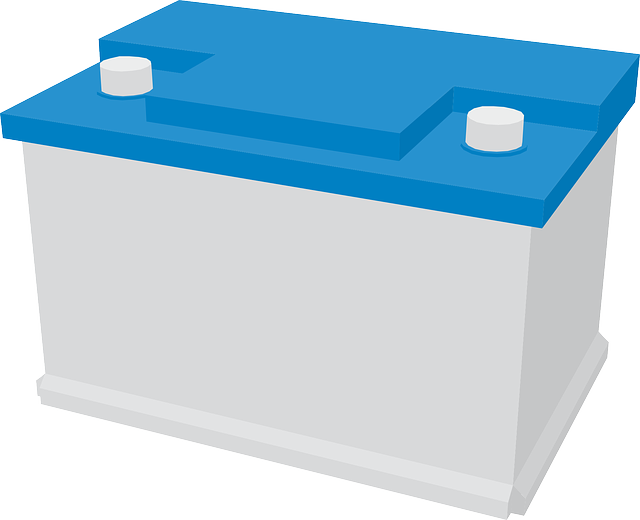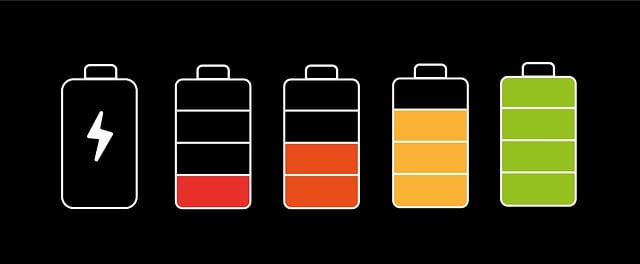Auxiliary batteries are essential in off-grid systems, serving as a supplementary power reserve that complements renewable energy sources like solar panels and wind turbines. They effectively manage energy supply by storing surplus power during high generation times and providing it during periods of low output, thus ensuring consistent electricity for both routine use and emergencies. Selecting the right auxiliary battery involves considering factors such as capacity, efficiency, lifespan, and compatibility with existing systems to maximize performance. Among various technologies, lithium-ion batteries are particularly advantageous due to their high energy density, extended cycle life, rapid charging and discharging capabilities, and resilience against frequent use. By adopting an auxiliary battery system tailored to off-grid needs and maintaining it properly, homeowners can enhance their energy self-sufficiency, reduce reliance on external power grids, and mitigate the impact of renewable energy fluctuations. These systems not only contribute to energy independence but also support sustainability goals by cutting down on carbon emissions typically associated with traditional energy sources. In summary, auxiliary batteries are a key technology for off-grid energy management, offering cost savings, reliability, and environmental benefits.
Auxiliary batteries are a cornerstone in optimizing off-grid living, offering a robust solution for energy storage and management. This article delves into the multifaceted advantages of incorporating auxiliary batteries within off-grid systems, emphasizing their role in enhancing power independence, stabilizing energy supply, and extending the lifespan of appliances. From understanding their integration to uncovering potential savings, discover how auxiliary batteries can significantly improve your off-grid experience.
- Understanding Auxiliary Batteries in Off-Grid Systems
- Enhanced Energy Independence with Auxiliary Batteries
- The Role of Auxiliary Batteries in Power Quality and Stability
- Maximizing Appliance Usage with Auxiliary Batteries in Off-Grid Settings
- Long-Term Savings and Longevity of Auxiliary Batteries for Off-Grid Living
Understanding Auxiliary Batteries in Off-Grid Systems

In off-grid living, auxiliary batteries play a pivotal role in energy storage and management. These batteries serve as a reserve power source, complementing the primary energy storage system such as solar panels or wind turbines. Auxiliary batteries are designed to handle peak loads or provide additional capacity during periods of low generation, ensuring a consistent electricity supply. Their integration into off-grid systems allows for the storage of excess energy generated during times of abundance, which can then be drawn upon when the main power sources are insufficient or unavailable. This not only enhances system reliability but also maximizes the use of renewable resources. Users benefit from a more stable and predictable power supply, critical for both everyday activities and emergencies. The choice of an auxiliary battery should consider factors like capacity, efficiency, lifespan, and compatibility with the existing off-grid setup to optimize energy storage and overall system performance.
When selecting an auxiliary battery for off-grid use, it is crucial to match the battery’s specifications with the energy demands of the system. Auxiliary batteries come in various types, including lead-acid, AGM, gel, and lithium-ion, each with its own set of characteristics and advantages. For instance, lithium-ion auxiliary batteries are renowned for their high energy density, long cycle life, and ability to handle multiple charging and discharging cycles without significant degradation. Additionally, they offer faster charge and discharge rates compared to traditional lead-acid options, which is particularly beneficial in off-grid scenarios where power may be needed quickly. By carefully selecting and maintaining the auxiliary battery, off-grid homeowners can significantly enhance their energy independence and resilience against power outages or fluctuations in renewable energy generation.
Enhanced Energy Independence with Auxiliary Batteries

Auxiliary batteries play a pivotal role in augmenting energy independence, particularly within off-grid settings. These power solutions provide an additional layer of storage capacity beyond what traditional home systems can offer. By storing excess energy generated from renewable sources like solar panels or wind turbines, auxiliary batteries ensure a consistent and reliable energy supply. This surplus energy can be harnessed during periods of low generation or when the primary system is undergoing maintenance, thus eliminating the reliance on external power grids. The ability to draw upon this reserve power not only enhances self-sufficiency but also offers peace of mind, knowing that energy needs are met without disruption.
Furthermore, auxiliary batteries are designed with advanced technology to handle various loads and can be tailored to specific energy requirements. They can absorb and deliver power in a way that is seamless and efficient, accommodating the fluctuating demands of household appliances or electronic devices. The integration of these batteries into an off-grid system means that users can enjoy the benefits of renewable energy without the constraints of intermittent supply. This heightened level of energy autonomy is not only cost-effective over time but also promotes a more sustainable lifestyle, aligning with environmental conservation efforts and reducing the carbon footprint associated with conventional power sources.
The Role of Auxiliary Batteries in Power Quality and Stability

Auxiliary batteries play a pivotal role in maintaining power quality and stability within off-grid systems, especially where traditional grid connections are unavailable or unreliable. These batteries serve as a buffer, smoothing out fluctuations that occur with renewable energy sources like solar panels and wind turbines. They ensure a consistent voltage supply by absorbing the surge when production exceeds demand and providing the necessary charge when generation is low. This buffering capacity not only protects sensitive electronic equipment from damage due to voltage spikes but also guarantees a steady power output that closely matches the clean, continuous energy one would expect from the grid. As a result, auxiliary batteries are instrumental in achieving energy independence while delivering high-quality power that can rival the stability of utility-supplied electricity. Their ability to store excess energy generated during peak production times and release it during periods of low generation is key to minimizing power interruptions, thereby enhancing the reliability of off-grid systems. This not only improves the user experience but also extends the lifespan of appliances and electronics by providing a more consistent power supply. The integration of auxiliary batteries, therefore, is essential for those seeking to rely on renewable energy sources while maintaining high standards of electrical performance.
Maximizing Appliance Usage with Auxiliary Batteries in Off-Grid Settings

In off-grid settings, auxiliary batteries play a pivotal role in maximizing appliance usage by providing a consistent power supply. These energy storage systems are designed to handle fluctuations in renewable energy generation, ensuring that household appliances function seamlessly without being tethered to the grid. Auxiliary batteries, such as lithium-ion or lead-acid models, store excess electricity generated from solar panels or wind turbines during peak production hours and release it during periods of low generation or high demand. This not only enhances the reliability of power but also allows for a more predictable and consistent energy supply, making it possible to run appliances like refrigerators, lights, and computing devices without interruption.
Moreover, with auxiliary batteries, users can optimize their energy consumption patterns by strategically timing the use of high-energy appliances. For instance, washing machines or dishwashers can be operated during off-peak hours when solar generation is optimal, leading to a more efficient energy management system. Auxiliary batteries also enable the use of sensitive electronic devices that require stable power sources. Their ability to deliver clean and steady current prevents damage from power surges or dips, thereby extending the lifespan of these appliances. This level of control and predictability over power usage is a significant advantage for those living off-grid, as it allows them to enjoy modern conveniences with the assurance that their auxiliary battery systems are working efficiently to meet their energy needs.
Long-Term Savings and Longevity of Auxiliary Batteries for Off-Grid Living

Auxiliary batteries play a pivotal role in off-grid living, offering significant long-term savings and impressive longevity. Investing in high-quality auxiliary batteries can markedly reduce energy costs associated with relying solely on traditional power grids. These batteries, designed to handle the demands of off-grid existence, store excess energy generated by solar panels or wind turbines during peak production times. This stored energy can then be used as needed, mitigating the need for costly grid electricity. Over time, the savings accrued from not drawing on utility company power can be substantial, especially in regions where electricity tariffs are high.
Moreover, the longevity of auxiliary batteries is another key advantage. Advanced technologies have led to the development of batteries with extended lifespans, capable of enduring thousands of charge and discharge cycles without a significant drop in performance. This durability ensures a consistent power supply for off-grid residents, reducing the frequency of replacements and associated costs. The choice of an auxiliary battery system that aligns with energy consumption habits can effectively support the needs of any off-grid setup, providing reliable power for years to come. The integration of these systems is not just a cost-effective measure but also a sustainable one, contributing to a reduced carbon footprint and greater energy independence.
Auxiliary batteries play a pivotal role in optimizing off-grid living, offering a suite of advantages from heightened energy independence to improved power quality and stability. By integrating these systems, users can extend their operational capacity, ensuring seamless functionality for various appliances, thereby enhancing the overall off-grid experience. Moreover, the investment in auxiliary batteries often translates into long-term savings and a prolonged lifespan, making them a sound choice for sustainable energy solutions. Homeowners and individuals considering an off-grid lifestyle would benefit from the adoption of these energy storage solutions, which are poised to become increasingly integral to our evolving relationship with power in remote settings.
